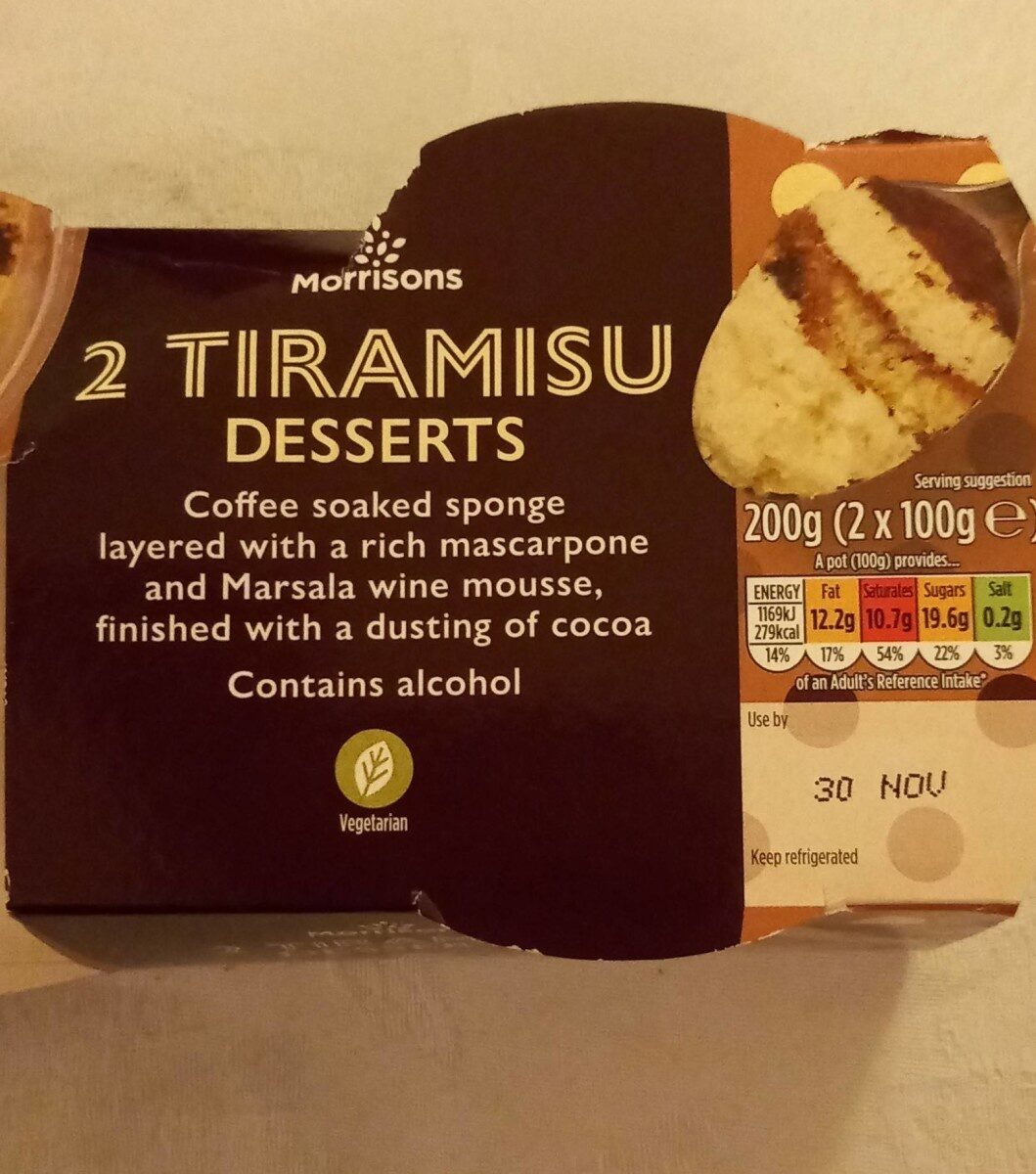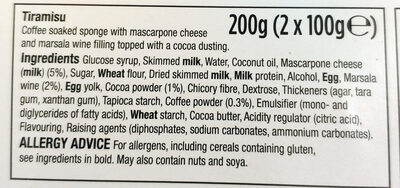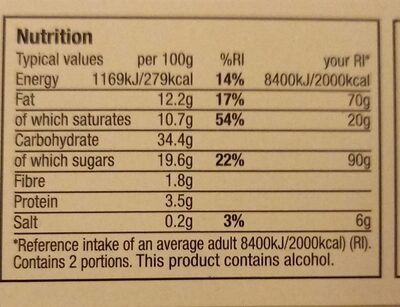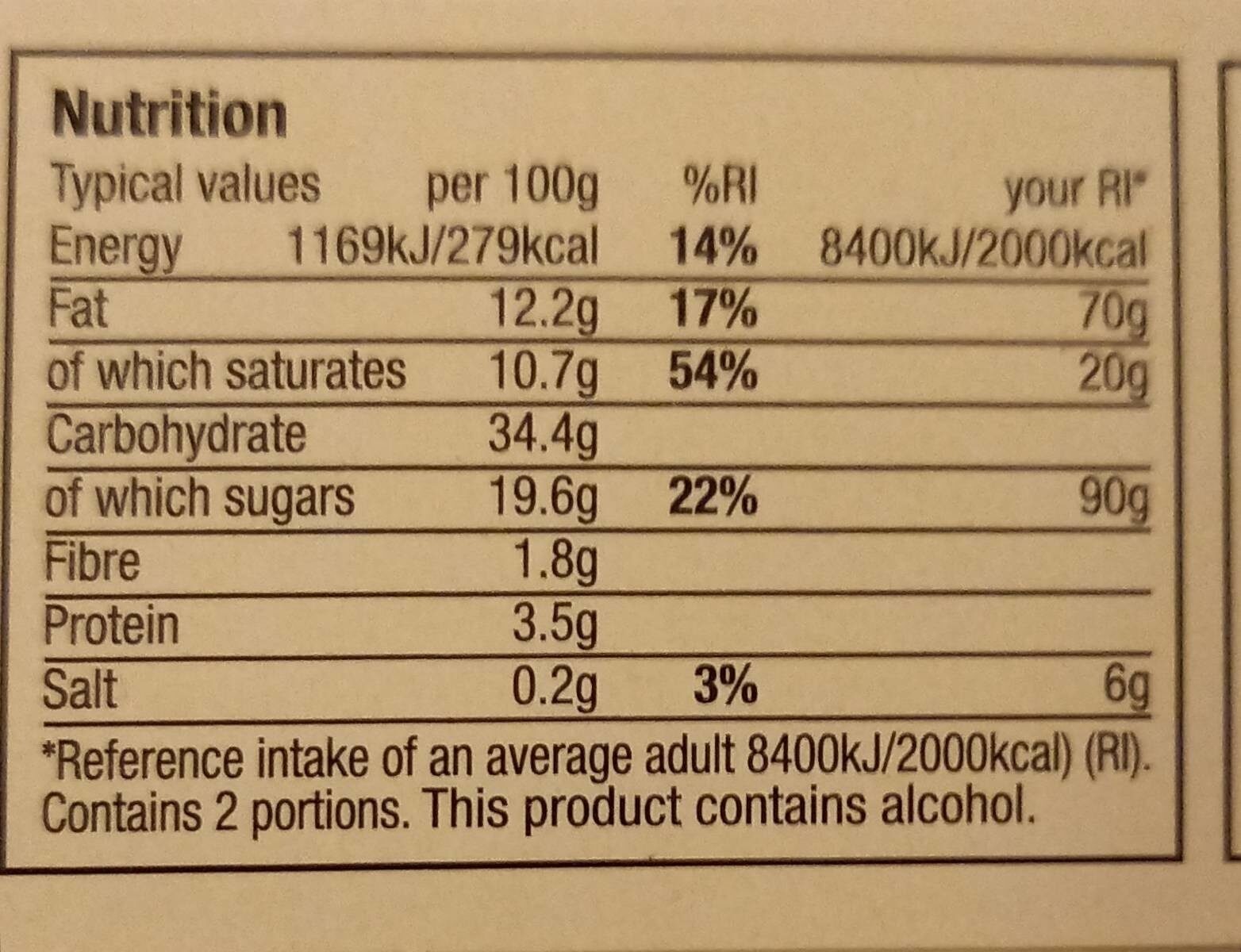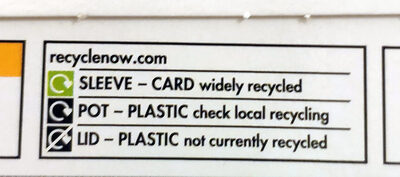Help us make food transparency the norm!
As a non-profit organization, we depend on your donations to continue informing consumers around the world about what they eat.
The food revolution starts with you!
2 Tiramisu - Morrisons - 200g
2 Tiramisu - Morrisons - 200g
This product page is not complete. You can help to complete it by editing it and adding more data from the photos we have, or by taking more photos using the app for Android or iPhone/iPad. Thank you!
×
Barcode: 5010251432654 (EAN / EAN-13)
Common name: Coffee soaked sponge with mascarpone cheese and marsala wine filling topped with a cocoa dusting
Quantity: 200g
Brands: Morrisons
Categories: Snacks, Sweet snacks, Biscuits and cakes, Pastries, Tiramisu
Labels, certifications, awards: Vegetarian, Made in Italy
Manufacturing or processing places: Italy
Traceability code: IT 03-271 CE
Link to the product page on the official site of the producer: https://groceries.store.morrisons.com/pr...
Stores: Morrisons
Countries where sold: United Kingdom
Matching with your preferences
Health
Ingredients
-
33 ingredients
Glucose syrup, Skimmed milk, Water, Coconut oil, Mascarpone cheese (milk) (5%), Sugar, Wheat flour, Dried skimmed milk, Milk protein, Alcohol, Egg, Marsala wine (2%), Egg yolk, Cocoa powder (1%), Chicory fibre, Dextrose, Thickeners (agar, tara gum, xanthan gum), Tapioca starch, Coffee powder (0.3%), Emulsifier (mono - and diglycerides of fatty acids), Wheat starch, Cocoa butter, Acidity regulator (citric acid), Flavouring, Raising agents (diphosphates, sodium carbonates, ammonium carbonates).Allergens: Eggs, Gluten, MilkTraces: Nuts, Soybeans
Food processing
-
Ultra processed foods
Elements that indicate the product is in the 4 - Ultra processed food and drink products group:
- Additive: E406 - Agar
- Additive: E415 - Xanthan gum
- Additive: E417 - Tara gum
- Additive: E450 - Diphosphates
- Additive: E471 - Mono- and diglycerides of fatty acids
- Ingredient: Dextrose
- Ingredient: Emulsifier
- Ingredient: Flavouring
- Ingredient: Glucose
- Ingredient: Glucose syrup
- Ingredient: Milk proteins
- Ingredient: Thickener
Food products are classified into 4 groups according to their degree of processing:
- Unprocessed or minimally processed foods
- Processed culinary ingredients
- Processed foods
- Ultra processed foods
The determination of the group is based on the category of the product and on the ingredients it contains.
Additives
-
E330 - Citric acid
Citric acid is a natural organic acid found in citrus fruits such as lemons, oranges, and limes.
It is widely used in the food industry as a flavor enhancer, acidulant, and preservative due to its tart and refreshing taste.
Citric acid is safe for consumption when used in moderation and is considered a generally recognized as safe (GRAS) food additive by regulatory agencies worldwide.
-
E406 - Agar
Agar: Agar -pronounced , sometimes - or agar-agar is a jelly-like substance, obtained from red algae.Agar is a mixture of two components: the linear polysaccharide agarose, and a heterogeneous mixture of smaller molecules called agaropectin. It forms the supporting structure in the cell walls of certain species of algae, and is released on boiling. These algae are known as agarophytes, and belong to the Rhodophyta -red algae- phylum.Agar has been used as an ingredient in desserts throughout Asia, and also as a solid substrate to contain culture media for microbiological work. Agar can be used as a laxative, an appetite suppressant, a vegetarian substitute for gelatin, a thickener for soups, in fruit preserves, ice cream, and other desserts, as a clarifying agent in brewing, and for sizing paper and fabrics.The gelling agent in agar is an unbranched polysaccharide obtained from the cell walls of some species of red algae, primarily from tengusa -Gelidiaceae- and ogonori -Gracilaria-. For commercial purposes, it is derived primarily from ogonori. In chemical terms, agar is a polymer made up of subunits of the sugar galactose.Source: Wikipedia
-
E415 - Xanthan gum
Xanthan gum (E415) is a natural polysaccharide derived from fermented sugars, often used in the food industry as a thickening and stabilizing agent.
This versatile food additive enhances texture and prevents ingredient separation in a wide range of products, including salad dressings, sauces, and gluten-free baked goods.
It is considered safe for consumption even at high intake amounts.
-
E450 - Diphosphates
Diphosphates (E450) are food additives often utilized to modify the texture of products, acting as leavening agents in baking and preventing the coagulation of canned food.
These salts can stabilize whipped cream and are also found in powdered products to maintain their flow properties. They are commonly present in baked goods, processed meats, and soft drinks.
Derived from phosphoric acid, they're part of our daily phosphate intake, which often surpasses recommended levels due to the prevalence of phosphates in processed foods and drinks.
Excessive phosphate consumption is linked to health issues, such as impaired kidney function and weakened bone health. Though diphosphates are generally regarded as safe when consumed within established acceptable daily intakes, it's imperative to monitor overall phosphate consumption to maintain optimal health.
-
E471 - Mono- and diglycerides of fatty acids
Mono- and diglycerides of fatty acids (E471), are food additives commonly used as emulsifiers in various processed foods.
These compounds consist of glycerol molecules linked to one or two fatty acid chains, which help stabilize and blend water and oil-based ingredients. E471 enhances the texture and shelf life of products like margarine, baked goods, and ice cream, ensuring a smooth and consistent texture.
It is generally considered safe for consumption within established regulatory limits.
-
E500 - Sodium carbonates
Sodium carbonates (E500) are compounds commonly used in food preparation as leavening agents, helping baked goods rise by releasing carbon dioxide when they interact with acids.
Often found in baking soda, they regulate the pH of food, preventing it from becoming too acidic or too alkaline. In the culinary world, sodium carbonates can also enhance the texture and structure of foods, such as noodles, by modifying the gluten network.
Generally recognized as safe, sodium carbonates are non-toxic when consumed in typical amounts found in food.
-
E503 - Ammonium carbonates
Ammonium carbonate: Ammonium carbonate is a salt with the chemical formula -NH4-2CO3. Since it readily degrades to gaseous ammonia and carbon dioxide upon heating, it is used as a leavening agent and also as smelling salt. It is also known as baker's ammonia and was a predecessor to the more modern leavening agents baking soda and baking powder. It is a component of what was formerly known as sal volatile and salt of hartshorn.Source: Wikipedia
Ingredients analysis
-
May contain palm oil
Ingredients that may contain palm oil: E471
-
Non-vegan
Non-vegan ingredients: Skimmed milk, Mascarpone, Skimmed milk, Milk proteins, Egg, Egg yolk
-
Vegetarian
No non-vegetarian ingredients detected
-
Details of the analysis of the ingredients
: Glucose syrup, Skimmed _milk_, Water, Coconut oil, Mascarpone cheese, Sugar, _Wheat_ flour, skimmed _milk_, _Milk_ protein, Alcohol, _Egg_, Marsala wine 2%, _Egg_ yolk, Cocoa powder 1%, Chicory fibre, Dextrose, Thickeners (agar, tara gum, xanthan gum), Tapioca starch, Coffee powder 0.3%, Emulsifier (mono- and diglycerides of fatty acids), _Wheat_ starch, Cocoa butter, Acidity regulator (citric acid), Flavouring, Raising agents (diphosphates, sodium carbonates, ammonium carbonates)- Glucose syrup -> en:glucose-syrup - vegan: yes - vegetarian: yes - ciqual_proxy_food_code: 31016 - percent_min: 4 - percent_max: 74.5
- Skimmed _milk_ -> en:skimmed-milk - vegan: no - vegetarian: yes - ciqual_proxy_food_code: 19051 - percent_min: 2 - percent_max: 38.25
- Water -> en:water - vegan: yes - vegetarian: yes - ciqual_food_code: 18066 - percent_min: 2 - percent_max: 26.1666666666667
- Coconut oil -> en:coconut-oil - vegan: yes - vegetarian: yes - from_palm_oil: no - ciqual_food_code: 16040 - percent_min: 2 - percent_max: 20.125
- Mascarpone cheese -> en:mascarpone - vegan: no - vegetarian: maybe - ciqual_food_code: 19584 - percent_min: 2 - percent_max: 16.5
- Sugar -> en:sugar - vegan: yes - vegetarian: yes - ciqual_proxy_food_code: 31016 - percent_min: 2 - percent_max: 14.0833333333333
- _Wheat_ flour -> en:wheat-flour - vegan: yes - vegetarian: yes - ciqual_proxy_food_code: 9410 - percent_min: 2 - percent_max: 12.3571428571429
- skimmed _milk_ -> en:skimmed-milk - vegan: no - vegetarian: yes - ciqual_proxy_food_code: 19051 - percent_min: 2 - percent_max: 11.0625
- _Milk_ protein -> en:milk-proteins - vegan: no - vegetarian: yes - percent_min: 2 - percent_max: 10.0555555555556
- Alcohol -> en:alcohol - vegan: maybe - vegetarian: yes - ciqual_food_code: 1014 - percent_min: 2 - percent_max: 9.25
- _Egg_ -> en:egg - vegan: no - vegetarian: yes - ciqual_food_code: 22000 - percent_min: 2 - percent_max: 8.59090909090909
- Marsala wine -> en:marsala-wine - vegan: maybe - vegetarian: yes - ciqual_food_code: 1015 - percent_min: 2 - percent: 2 - percent_max: 2
- _Egg_ yolk -> en:egg-yolk - vegan: no - vegetarian: yes - ciqual_food_code: 22002 - percent_min: 1 - percent_max: 2
- Cocoa powder -> en:cocoa-powder - vegan: yes - vegetarian: yes - ciqual_food_code: 18100 - percent_min: 1 - percent: 1 - percent_max: 1
- Chicory fibre -> en:chicory-fibre - vegan: yes - vegetarian: yes - ciqual_food_code: 20026 - percent_min: 0.3 - percent_max: 1
- Dextrose -> en:dextrose - vegan: yes - vegetarian: yes - ciqual_proxy_food_code: 31016 - percent_min: 0.3 - percent_max: 1
- Thickeners -> en:thickener - percent_min: 0.3 - percent_max: 1
- agar -> en:e406 - vegan: yes - vegetarian: yes - ciqual_food_code: 11084 - percent_min: 0 - percent_max: 1
- tara gum -> en:e417 - vegan: yes - vegetarian: yes - percent_min: 0 - percent_max: 0.5
- xanthan gum -> en:e415 - vegan: yes - vegetarian: yes - percent_min: 0 - percent_max: 0.333333333333333
- Tapioca starch -> en:tapioca - vegan: yes - vegetarian: yes - ciqual_proxy_food_code: 9510 - percent_min: 0.3 - percent_max: 1
- Coffee powder -> en:coffee-powder - vegan: yes - vegetarian: yes - ciqual_proxy_food_code: 18003 - percent_min: 0.3 - percent: 0.3 - percent_max: 0.3
- Emulsifier -> en:emulsifier - percent_min: 0 - percent_max: 0.3
- mono- and diglycerides of fatty acids -> en:e471 - vegan: maybe - vegetarian: maybe - from_palm_oil: maybe - percent_min: 0 - percent_max: 0.3
- _Wheat_ starch -> en:wheat-starch - vegan: yes - vegetarian: yes - ciqual_proxy_food_code: 9510 - percent_min: 0 - percent_max: 0.3
- Cocoa butter -> en:cocoa-butter - vegan: yes - vegetarian: yes - ciqual_food_code: 16030 - percent_min: 0 - percent_max: 0.3
- Acidity regulator -> en:acidity-regulator - percent_min: 0 - percent_max: 0.3
- citric acid -> en:e330 - vegan: yes - vegetarian: yes - percent_min: 0 - percent_max: 0.3
- Flavouring -> en:flavouring - vegan: maybe - vegetarian: maybe - percent_min: 0 - percent_max: 0.3
- Raising agents -> en:raising-agent - percent_min: 0 - percent_max: 0.3
- diphosphates -> en:e450 - vegan: yes - vegetarian: yes - percent_min: 0 - percent_max: 0.3
- sodium carbonates -> en:e500 - vegan: yes - vegetarian: yes - percent_min: 0 - percent_max: 0.15
- ammonium carbonates -> en:e503 - vegan: yes - vegetarian: yes - percent_min: 0 - percent_max: 0.1
Nutrition
-
Poor nutritional quality
⚠ ️Warning: the amount of fruits, vegetables and nuts is not specified on the label, it was estimated from the list of ingredients: 0This product is not considered a beverage for the calculation of the Nutri-Score.
Positive points: 1
- Proteins: 2 / 5 (value: 3.5, rounded value: 3.5)
- Fiber: 1 / 5 (value: 1.8, rounded value: 1.8)
- Fruits, vegetables, nuts, and colza/walnut/olive oils: 0 / 5 (value: 0.15, rounded value: 0.2)
Negative points: 17
- Energy: 3 / 10 (value: 1169, rounded value: 1169)
- Sugars: 4 / 10 (value: 19.6, rounded value: 19.6)
- Saturated fat: 10 / 10 (value: 10.7, rounded value: 10.7)
- Sodium: 0 / 10 (value: 80, rounded value: 80)
The points for proteins are not counted because the negative points are greater or equal to 11.
Nutritional score: (17 - 1)
Nutri-Score:
-
Nutrient levels
-
Fat in moderate quantity (12.2%)
What you need to know- A high consumption of fat, especially saturated fats, can raise cholesterol, which increases the risk of heart diseases.
Recommendation: Limit the consumption of fat and saturated fat- Choose products with lower fat and saturated fat content.
-
Saturated fat in high quantity (10.7%)
What you need to know- A high consumption of fat, especially saturated fats, can raise cholesterol, which increases the risk of heart diseases.
Recommendation: Limit the consumption of fat and saturated fat- Choose products with lower fat and saturated fat content.
-
Sugars in high quantity (19.6%)
What you need to know- A high consumption of sugar can cause weight gain and tooth decay. It also augments the risk of type 2 diabetes and cardio-vascular diseases.
Recommendation: Limit the consumption of sugar and sugary drinks- Sugary drinks (such as sodas, fruit beverages, and fruit juices and nectars) should be limited as much as possible (no more than 1 glass a day).
- Choose products with lower sugar content and reduce the consumption of products with added sugars.
-
Salt in low quantity (0.2%)
What you need to know- A high consumption of salt (or sodium) can cause raised blood pressure, which can increase the risk of heart disease and stroke.
- Many people who have high blood pressure do not know it, as there are often no symptoms.
- Most people consume too much salt (on average 9 to 12 grams per day), around twice the recommended maximum level of intake.
Recommendation: Limit the consumption of salt and salted food- Reduce the quantity of salt used when cooking, and don't salt again at the table.
- Limit the consumption of salty snacks and choose products with lower salt content.
-
-
Nutrition facts
Nutrition facts As sold
for 100 g / 100 mlAs sold
per serving (100g)Compared to: Tiramisu Energy 1,169 kj
(279 kcal)1,170 kj
(279 kcal)+8% Fat 12.2 g 12.2 g +3% Saturated fat 10.7 g 10.7 g +22% Carbohydrates 34.4 g 34.4 g +7% Sugars 19.6 g 19.6 g +5% Fiber 1.8 g 1.8 g +43% Proteins 3.5 g 3.5 g -14% Salt 0.2 g 0.2 g +20% Fruits‚ vegetables‚ nuts and rapeseed‚ walnut and olive oils (estimate from ingredients list analysis) 0.15 % 0.15 %
Environment
-
Eco-Score E - Very high environmental impact
The Eco-Score is an experimental score that summarizes the environmental impacts of food products.→ The Eco-Score was initially developped for France and it is being extended to other European countries. The Eco-Score formula is subject to change as it is regularly improved to make it more precise and better suited to each country.Life cycle analysis
-
Average impact of products of the same category: E (Score: 17/100)
Category: Tiramisu, refrigerated
Category: Tiramisu, refrigerated
- PEF environmental score: 1.66 (the lower the score, the lower the impact)
- including impact on climate change: 11.23 kg CO2 eq/kg of product
Stage Impact Agriculture
82.9 %Processing
13.7 %Packaging
0.9 %Transportation
1.7 %Distribution
0.5 %Consumption
0.1 %
Bonuses and maluses
-
Missing origins of ingredients information
Malus: -5
⚠ ️ The origins of the ingredients of this product are not indicated.
If they are indicated on the packaging, you can modify the product sheet and add them.
If you are the manufacturer of this product, you can send us the information with our free platform for producers.
-
Missing packaging information for this product
Malus: -15
⚠ ️ The information about the packaging of this product is not filled in.⚠ ️ For a more precise calculation of the Eco-Score, you can modify the product page and add them.
If you are the manufacturer of this product, you can send us the information with our free platform for producers.
Eco-Score for this product
-
Impact for this product: E (Score: -3/100)
Product: 2 Tiramisu - Morrisons - 200g
Life cycle analysis score: 17
Sum of bonuses and maluses: -20
Final score: -3/100
-
Carbon footprint
-
Equal to driving 5.8 km in a petrol car
1123 g CO² per 100g of product
The carbon emission figure comes from ADEME's Agribalyse database, for the category: Tiramisu, refrigerated (Source: ADEME Agribalyse Database)
Stage Impact Agriculture
75.7 %Processing
19.6 %Packaging
1.7 %Transportation
2.6 %Distribution
0.3 %Consumption
0.1 %
Packaging
-
Missing packaging information for this product
⚠ ️ The information about the packaging of this product is not filled in.Take a photo of the recycling information Take a photo of the recycling information
Transportation
-
Origins of ingredients
Missing origins of ingredients information
⚠ ️ The origins of the ingredients of this product are not indicated.
If they are indicated on the packaging, you can modify the product sheet and add them.
If you are the manufacturer of this product, you can send us the information with our free platform for producers.Add the origins of ingredients for this product Add the origins of ingredients for this product
Report a problem
-
Incomplete or incorrect information?
Category, labels, ingredients, allergens, nutritional information, photos etc.
If the information does not match the information on the packaging, please complete or correct it. Open Food Facts is a collaborative database, and every contribution is useful for all.
Data sources
Product added on by alia
Last edit of product page on by ecoscore-impact-estimator.
Product page also edited by kiliweb, openfoodfacts-contributors, yuka.sY2b0xO6T85zoF3NwEKvlhJLT4bOkjD2ET7jox2xy-6kL8LKX9J869P6M6g.

